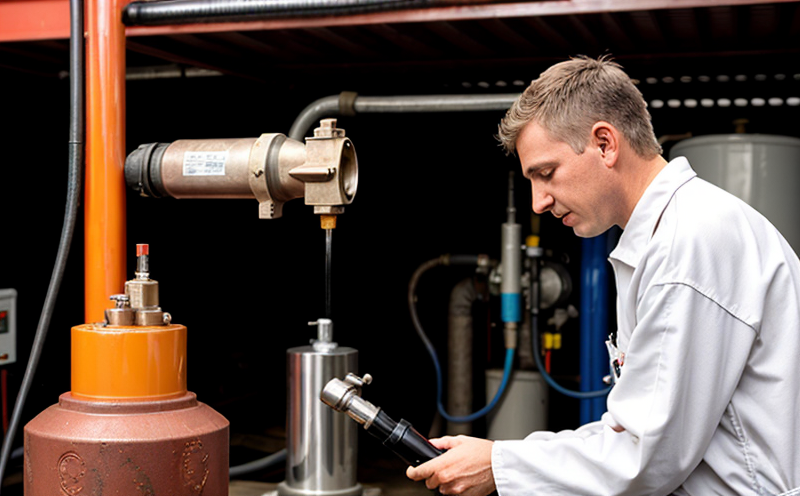ASTM D3227 Mercaptan Sulfur Testing of Aviation Fuel
The ASTM D3227 mercaptan sulfur test is a critical procedure used to ensure the quality and safety of aviation fuel. This method quantifies the total sulfur content due to mercaptans in jet fuel, which plays a significant role in preventing engine corrosion and ensuring optimal performance. The test is particularly important for aviation fuels as it helps maintain compliance with international standards such as ASTM D1652.
The process involves the chemical reduction of sulfurs using zinc powder and hydrochloric acid. Once reduced, the mercaptans are then oxidized by hydrogen peroxide to form sulfur dioxide. This gas is absorbed by a solution containing thymol blue indicator, which changes color based on the concentration of sulfur dioxide present. The absorbance of this solution provides a measure of the total mercaptan content in the sample.
The significance of this test lies in its ability to detect even trace amounts of mercaptans, which can be detrimental if they exceed specified limits set by aviation fuel specifications. High levels of mercaptans can lead to increased corrosion rates within aircraft engines and other metal components, potentially causing costly maintenance issues or operational disruptions.
Our laboratory utilizes state-of-the-art analytical instruments to perform ASTM D3227 testing efficiently and accurately. Our team of experienced chemists ensures that each sample is handled meticulously from initial preparation through final analysis. By adhering strictly to industry best practices and rigorous quality control measures, we guarantee reliable results every time.
Understanding the importance of this test, we offer comprehensive support services beyond just executing it. From consultation on proper sampling techniques to interpreting results in relation to specific fuel blends or batch characteristics, our experts are here to provide guidance at every step. Additionally, we can assist in identifying potential sources of contamination that might affect your aviation fuel quality.
Our commitment to excellence extends not only to technical proficiency but also to prompt delivery and clear communication of findings. Timely reporting ensures that you receive actionable insights promptly so that necessary corrective actions can be taken swiftly if required. With our expertise, you gain confidence in knowing that your aviation fuels meet stringent regulatory requirements while enhancing overall safety standards for aircraft operations.
Customer Impact and Satisfaction
The impact of ASTM D3227 mercaptan sulfur testing on customers is profound. By ensuring low levels of mercaptans in aviation fuel, we help prevent costly maintenance issues related to engine corrosion. This translates directly into reduced downtime for airlines, increased operational efficiency, and ultimately lower overall costs.
Our customers benefit from our high level of customer satisfaction due to several factors:
- Accurate Results: We use advanced analytical techniques to provide precise measurements, which are crucial for maintaining fuel quality.
- Timely Delivery: Rapid turnaround times ensure that you receive your reports quickly so that any necessary adjustments can be made promptly.
- Clear Communication: Our experts interpret the results clearly, offering recommendations tailored to your specific needs and operational context.
Customer feedback consistently highlights our ability to deliver reliable data that supports informed decision-making processes. This trust has led us to establish long-standing relationships with many leading aviation companies worldwide.
International Acceptance and Recognition
The ASTM D3227 mercaptan sulfur test is widely accepted internationally, particularly in regions where aviation fuel quality standards are stringent. Many countries have adopted this standard as part of their regulatory frameworks to ensure consistent fuel performance across borders.
ISO/IEC 17025 accreditation ensures that our laboratory meets the highest standards for technical competence and reliability. This accredits us to perform tests according to international best practices, including ASTM D3227. Our adherence to these guidelines guarantees that the results we produce are valid and can be trusted by regulatory bodies around the world.
Our international recognition extends beyond mere accreditation; it reflects our commitment to delivering consistent, high-quality services wherever they may be needed. Whether you're an airline operating globally or a manufacturer serving diverse markets, our expertise helps meet global standards without compromising on local requirements.
Competitive Advantage and Market Impact
By leveraging ASTM D3227 mercaptan sulfur testing services, businesses in the aerospace and aviation sectors gain a significant competitive edge. Maintaining fuel quality is essential for both safety and operational efficiency, which directly impacts an organization's reputation and profitability.
Our service contributes to several key areas that enhance competitiveness:
- Enhanced Safety: By detecting harmful mercaptans early, we help prevent accidents caused by engine corrosion or other fuel-related issues.
- Improved Efficiency: Reduced maintenance costs and fewer disruptions translate into higher operational efficiency, benefiting both airlines and manufacturers alike.
- Regulatory Compliance: Ensuring compliance with international standards helps avoid penalties and enhances the company's standing in the marketplace.
In addition to these tangible benefits, our service fosters a culture of excellence within organizations by promoting continuous improvement practices. This proactive approach sets companies apart from their competitors, building long-term success in an increasingly competitive industry.





